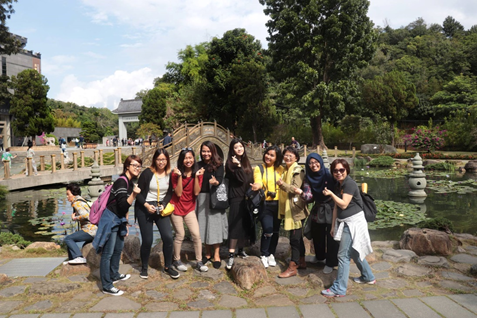In an effort to increase awareness and cultivate cultural competence of future psychologists, “Cultural Psychology” is first offered at the department of Psychology in fall semester 2018. This course is co-taught by Drs. Shujen Lee Chang, Hung Chiao, and Hsiu-Chen Lin. In this course, how cultures may contribute to individual differences and social behaviors is addressed. Seven students from Taiwan, Thailand, and Indonesia have been curious, respectful, and interested in knowing and appreciating more about their own and peers’ cultures, identities, socioeconomic background, and home country’s history.
Cultural site visit to Chung Tai Chan Monastery on November 29 was one of the highlights of this class. Ms. Sakinah Nur Rokhmah, a Muslim, found there is similarity existing in Indonesia about “how Buddhism gives greetings, and also how they respect and practice Buddhism well as followers of Buddhism, and the contents of the teachings taught.” As stated by Ms. Linda Yu who has no religious belief, “I think that the important thing to learn from this visit is how to respect different religions.”
As a Buddhist from Thailand, Ms. Wassana Buaniew was amazed by “the largest and the most luxury Buddhist monastery” she had ever seen. She also felt confused the majority spaces inside Chung Tai Chan Monastery was used to “represent the splendor of statues and religious stories, rather than the meditation area, which is the heart of the religion.” Ms. Helena Jovita Tanjaya, a Christian from Indonesia, was impressed by the focus of Buddhism teaching on education and nature. She shared “it can be seen that children are taught many languages and other subjects at school and learn how to plant rice.”
In congruence with the core values of this class, cultural competency is ultimately about respect, learning to respect our own and each other’s identity, standing up to actions that erode these rights and exploring ways to demonstrate this commitment every day.





